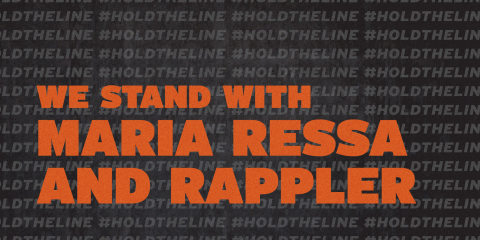
The #HoldTheLine Coalition condemns new legal threats against Rappler founder and CEO Maria Ressa and calls for a second, trumped-up criminal cyber libel charge to be dropped.
Ressa posted bail after the new arrest warrant was filed on 27 November, and will appear in court on Friday, 4 December. The new cyber libel case was filed by businessman Wilfredo Keng, related to a single tweet posted by Ressa in February 2019. The tweet included screenshots of an earlier story from another publication alleging ties between Keng and a judge in the Philippines -- one of the sources of the Rappler article that was the basis of a separate cyber libel charge on which Ressa was convicted in June.
“We are alarmed by this escalation of threats against Maria Ressa and call on the Duterte regime to cease its baseless legal attacks on Ressa and Rappler in an attempt to silence their public interest reporting. It is absurd that a journalist tweeting about another publication’s story could be jailed. We call for the new charge to be dropped immediately, and for Ressa’s conviction on an earlier criminal cyber libel charge to be quashed,” said the #HoldTheLine steering committee.
This marks the ninth arrest warrant issued against Ressa, who has been arrested twice in the past two years. At least eight cases are currently open against her, including criminal tax charges. Ressa faces a possible six-year prison sentence if the existing cyber libel conviction is not overturned on appeal, and the new cyber libel charge carries a possible sentence of seven years’ imprisonment. If convicted on all charges, Ressa could be looking at a lifetime in prison.
In a statement issued by her legal team, Ressa said “The legal acrobatics to harass and intimidate me continue, but these moves only convince me that we have to fight back and demand justice."
The latest move against Ressa takes place in the context of an overall deteriorating media freedom climate in the Philippines, where four journalists have been killed this year - most recently on 14 November.
The #HoldTheLine Coalition - a global collective of more than 75 civil society and journalism organisations - was formed to defend the prominent Filipino-American editor after she was convicted on the first criminal cyber libel charge in June 2020. The Coalition launched a petition calling for public support for Maria Ressa and independent media in the Philippines, which remains open for signature.
The #HoldTheLine steering committee is composed of representatives of the Committee to Protect Journalists (CPJ), the International Center for Journalists (ICFJ), and Reporters Without Borders (RSF). For further details, contact Courtney Radsch (cradsch@cpj.org), Julie Posetti (jposetti@icfj.org), and Rebecca Vincent (rvincent@rsf.org).
Note: This statement is issued under the authority of the #HoldTheLine steering committee but it does not necessarily reflect the position of all or any individual Coalition members or organizations.